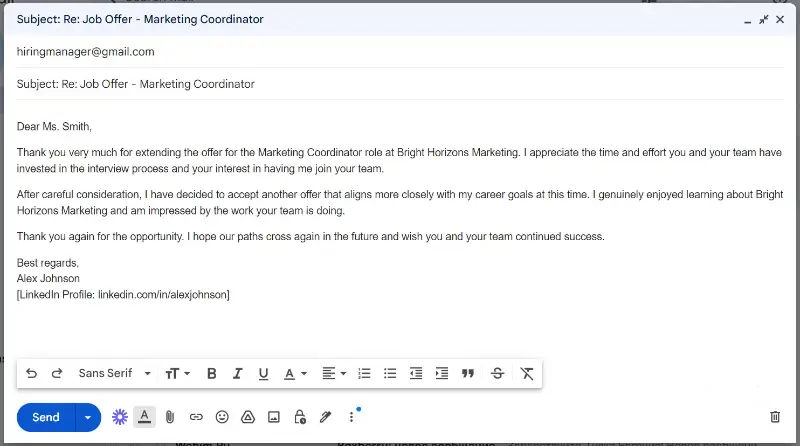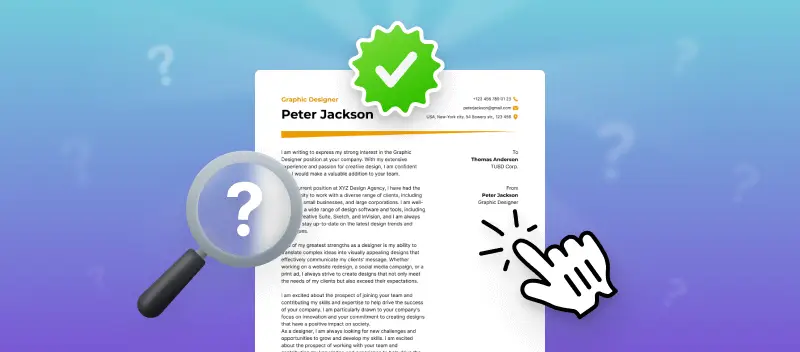How long does it take to write a resume? The answer varies depending on several factors, such as your experience, the job, and the level of detail you want to include.
In this article, we’ll explore the time investment involved in making an application. We'll also provide tips for creating a polished paper that showcases your skills and qualifications faster.
How long does it take to write a resume based on career level?
Crafting a strong document is essential in making a great first impression. But many job seekers are unsure how much time they should dedicate to this important task.
Here’s a breakdown of how long to make a resume:
- 1. Entry-Level (0-2 years of experience)
If you're just beginning your career or transitioning from education to the workforce, your resume will primarily focus on your academic background.
You may also highlight part-time roles or extracurricular activities that demonstrate transferable abilities.
Estimated Resume Writing Time: 3 to 6 hours
- Information Gathering (1-2 hours). Organizing your education, internships, volunteer work, skills, and accomplishments will consume some time. Reflecting on your experiences to underscore key strengths is essential.
- Writing and Modification (1-2 hours). With limited professional history, your goal will be to show potential and emphasize how your capacities align with the employer’s needs. Tailoring your application for each job posting is important.
- Proofreading (1-2 hours). Structuring your resume clearly and ensuring it’s free of errors will take extra time.
- 2. Mid-Level (3-10 years of experience)
At this stage, you’ll have more to showcase in terms of job roles, promotions, and achievements. Your application should demonstrate career progression, leadership experience, and specialized competencies.
Estimated Resume Writing Time: 4 to 8 hours
- Review and Update (1-2 hours). Revisiting your existing resume to incorporate your latest occupations and refining descriptions of your past posts will be necessary.
- Tailoring for Specific Jobs (1-3 hours). Customizing the document for each position you’re applying to involves spotlighting skills and experiences that match the job requirements.
- Proofreading (1-2 hours). Polishing your paper for clarity and ensuring that all details are accurate and visually appealing will call for time.
- 3. Executive (10+ years of experience)
For senior positions, your resume will need to reflect leadership, strategic decision-making, and measurable results. The focus shifts to high-level achievements and your ability to impact the organization.
Estimated Resume Writing Time: 8 to 12 hours (or more)
- Prioritizing (2-3 hours). Compiling your extensive experience and contributions can take longer, especially if your career spans multiple roles with varied accomplishments.
- Tailoring for Executive Roles (3-5 hours). Outlining strategic vision and quantifiable successes—such as revenue growth or team development—requires thoughtful customization for each job.
- Design and Final Edits (2-3 hours). Your application must be meticulously polished. You’ll have to verify that your presentation is clean and concise.
How long does it take to write a good resume based on industry?
Each field has its own expectations regarding format, content, and emphasis on specific skills or experiences.
- 1. Creative
In artistic sectors, resumes should not only showcase your experience but also reinforce your visual style and portfolio.
Estimated Resume Writing Time: 5 to 8 hours
- Portfolio Preparation (1-2 hours). Gather evidence of your past projects, campaigns, and any artworks to showcase.
- Variation for Industry Needs (2-3 hours). Creative applications often need to be personalized.
- Design (2-3 hours). Focus on the layout and visual appeal. The design should be cohesive with your brand, which can take extra time, particularly if you want something unique.
- 2. Tech
In the IT world, employers prioritize specific hard skills, software proficiencies, and project experience. Resumes for these roles tend to be straightforward.
Estimated Resume Writing Time: 3 to 6 hours
- Technical Skills Gathering (1-2 hours). Collect all programming languages, certifications, and tools you’ve worked with.
- Role-Specific Alteration (1-2 hours). Tailor the content to point out projects or technical solutions you’ve developed.
- ATS Optimization (1-2 hours). After ensuring the content is error-free, refine the language for clarity and make adjustments to pass Applicant Tracking Systems (ATS) by including keywords.
- 3. Healthcare
For medical roles, resumes emphasize credentials, clinical experiences, and specialized skills.
The format is typically more traditional, with a focus on qualifications that demonstrate your ability to provide patient care or conduct research.
Estimated Resume Writing Time: 4 to 7 hours
- Credential Compilation (1-2 hours). Assemble your trainings, licenses, and work history.
- Tailoring for Specific Roles (2-3 hours). Depending on the type of healthcare position, such as nursing or clinical research, adjust your document to focus on the most pertinent skills.
- Refining (1-2 hours). Carefully review the details for accuracy, ensuring that certificates are clearly stated and up to date.
- 4. Finance and Accounting
In these spheres, your resume should spotlight your financial expertise, certifications, and accomplishments like cost savings, analysis, or process improvements. These roles require precision and attention to detail.
Estimated Resume Writing Time: 3 to 5 hours
- Gathering Financial Experience (1-2 hours). Compile details about your past roles, including projects, impact, and any credentials.
- Customizing (1-2 hours). Adjust the resume to emphasize relevant skills for auditing, budgeting, or analysis.
- Adjustments (1 hour). Ensure all numbers are represented accurately, with a strong focus on clarity and formatting.
- 5. Law
Legal resumes require a more formal tone, highlighting internships and degrees. The focus is on qualifications, casework, and areas of law expertise.
Estimated Resume Writing Time: 4 to 6 hours
- Academic and Legal Compilation (1-2 hours). Gather educational reports, clerkships, and any case management work.
- Adaptation (1-2 hours). Tailor your document for niche areas, whether you're searching for a litigation position or a corporate consultant role.
- Formatting (1-2 hours). Focus on making the resume visually clean and structured, and check all data is accurate.
- 6. Education
In academia, your resume (or CV) should accent your teaching experience, publications, and any relevant development.
Estimated Resume Writing Time: 4 to 7 hours
- Statistics Gathering (1-2 hours). Collect data about your degrees, extracurricular activities, articles, and academic awards.
- Tailoring (1-2 hours). Depending on whether you're applying to a university, school, or institute, customize the application to showcase the accomplishments.
- Review (1-2 hours). Double-check that all credentials are accurate, and refine the language to ensure clarity.
Tips on how to reduce resume time
1. Use a resume builder
Resume templates offer a pre-designed structure, allowing you to focus on content rather than format. Many customizable options are available for different industries.
Select a template that suits the job you’re applying for to minimize the need for extensive changes.
Create your professional Resume in 10 minutes for FREE
Build My Resume
2. Keep a master resume
This document contains all your experience, qualifications, and achievements in one place. It speeds up the process when tailoring for specific applications.
Regularly update this text, so you only need to select the relevant information when applying for new positions.
3. Emphasize key contributions
Focusing on accomplishments rather than a long list of tasks makes your resume more impactful and saves time by cutting unnecessary content.
Highlight measurable results (e.g., “boosted revenue by 30%”) to make a stronger impression.
4. Use bullets
Bullet points condense facts into easily digestible sections, making your document quicker to read and edit.
Limit each role to 3-5 short lines, emphasizing the most important aspects.
5. Concentrate on relevance
Focusing on the most pertinent qualifications reduces the amount of information you need to include.
Review the job description to leave out irrelevant details.
6. Utilize AI tools
Resume builder streamline the process by offering content suggestions, checking grammar, and optimizing for ATS compatibility.
Platforms like Resume Trick can help you create a polished document in less time.
7. Limit length
Keeping your application concise allows for easier customization and quicker updates. Avoid outdated details.
Stick to one page for entry or mid-level positions, and two for more senior roles.
FAQ
- Can I complete my resume in one sitting?
- It’s possible, but depending on the level of detail required, you might want to break the task into smaller segments.
- Can resume-writing software really save time?
- Yes, they can be a huge time-saver. These tools often provide industry-specific templates, guidance on how to phrase your experience, and tips for improving layout.
- Is there a specific time of day that’s better for writing my resume?
- It depends on when you feel most productive. If you work best in the morning, start then. If you’re more creative in the evening, that’s when you should focus on crafting your document. Scheduling uninterrupted blocks of time will also improve efficiency.
- Should I include every job I’ve ever had?
- No, only those that are relevant to the position. Highlight experience that adds value to the role.
- How do I avoid procrastination?
- Start by breaking the process into manageable parts. Focus on one section at a time. Set small deadlines for each block. Keeping the task organized and simple will help you maintain momentum.
Conclusion
The time it takes to write a resume can vary significantly based on factors like your career level, industry, and the complexity of the job.
Whether you're crafting your first application, updating an existing one, or tailoring it for a specific job, it's important to allocate enough time to create a document that effectively highlights your strengths.
Ultimately, investing time in your resume now will pay off in the long run, helping you stand out to potential employers and increasing your chances of landing an interview.
Create your professional Resume in 10 minutes for FREE
Build My Resume





















